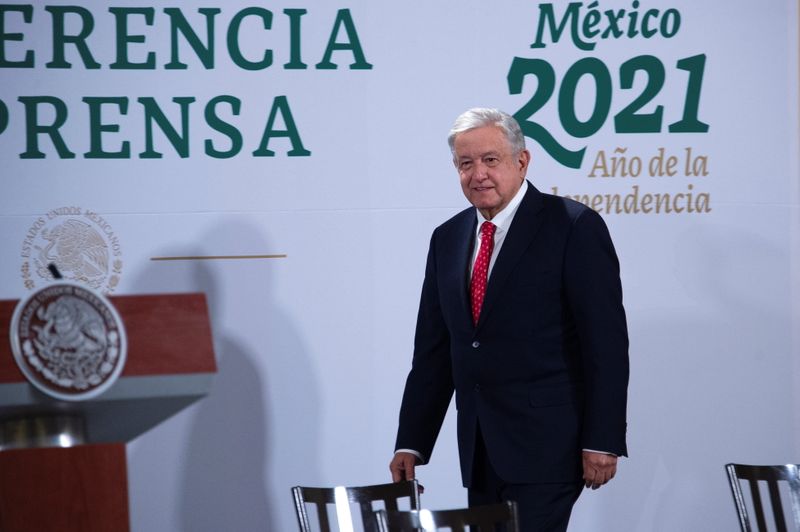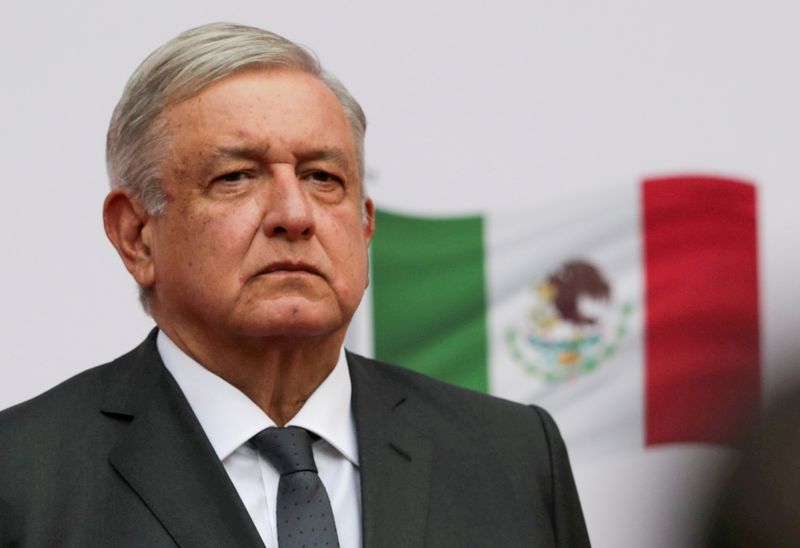By Raul Cortes and Stefanie Eschenbacher
MEXICO CITY (Reuters) - Mexico's President Andres Manuel Lopez Obrador said on Sunday he had tested positive for COVID-19 amid the country's deadliest week yet in the coronavirus pandemic, which has pushed the health system of the Mexican capital to its limits.
The 67-year-old president, who was a heavy smoker until suffering a major heart attack in 2013, said in a tweet that his symptoms were light and he was receiving treatment.
"As always, I am optimistic," said Lopez Obrador, who has resisted wearing a face mask in public since the virus reached Mexico over 10 months ago.
The president, who is back in Mexico City after a three-day visit to parts of northern and central Mexico, said he would continue working, and still planned to take part in a call with Russian President Vladimir Putin on Monday morning.
But the veteran leftist will step back from his regular public schedule, which has dominated the country's political life since he first took office in December 2018.
Critics have railed incessantly against his management of the health crisis, but despite a mounting toll of nearly 150,000 dead, his popularity has risen during the pandemic, according a daily tracking poll by polling firm Consulta Mitofsky.
The president has maintained a busy agenda, meeting his security cabinet at 6 a.m. every morning then holding daily news conferences of two hours or more from 7 a.m. At the weekends, he often tours the country, just as he did when in opposition.
Several close aides have contracted the virus in the past few months, but he has always insisted that he is in good health and has taken care of himself since the 2013 heart attack, after which he quit smoking.
"Fortunately, the president is stable at the moment, the symptoms are mild," Jose Luis Alomia, a senior Mexican health official told a daily news conference shortly after Lopez Obrador announced he had the virus.
Specialists were attending the president, Alomia said.
The health ministry said officials were reviewing who the president had been in contact with in the past few days and that most of them would self-isolate. Economy Minister Tatiana Clouthier was isolating, a spokeswoman said.
Lopez Obrador made an uncertain start to the pandemic, which has led to the fourth-highest death toll worldwide in Mexico. Initially the president urged people to hug each other and to keep going out. Later, he told them to stay at home.
NO LOCKDOWNS
Throughout the emergency, Lopez Obrador has shied away from imposing strict curbs on the public. In October, he even criticized European countries for adopting tough lockdown measures, suggesting they smacked of authoritarianism.
Many Mexicans live from hand-to-mouth and the government has been loath to restrict commercial activity lest it deprive people of their livelihoods and encourage crime.
Lopez Obrador's strategy has focused on increasing hospital capacity over testing and contact tracing. Instead of lockdowns, Mexico has used a tiered system of restrictions from state to state to limit the impact on the economy.
However, hospitals in Mexico City are near capacity because of the surge in cases, and nearly 9,000 new fatalities were registered in the past week, easily the worst seven-day tally.
Critics have for months said the president was at risk of contracting the virus due to his schedule.
His two predecessors as president, Enrique Pena Nieto and Felipe Calderon, both of whom Lopez Obrador has pilloried as part of a corrupt political system, quickly wished him well.
"Sincerely, I wish for the president's quick recovery," Calderon said on Twitter.
Lopez Obrador said on Twitter his interior minister Olga Sanchez would run his morning news conference in his absence.
His absence may sap some vigor from the government's rollout of its vaccine program, which is currently solely reliant on the product developed by U.S. drugmaker Pfizer (NYSE:PFE).

Lopez Obrador is due to discuss the possible acquisition of Russia's Sputnik V vaccine with Putin on Monday as Mexico seeks to give itself more options in the fight against the virus.
